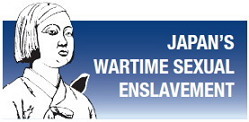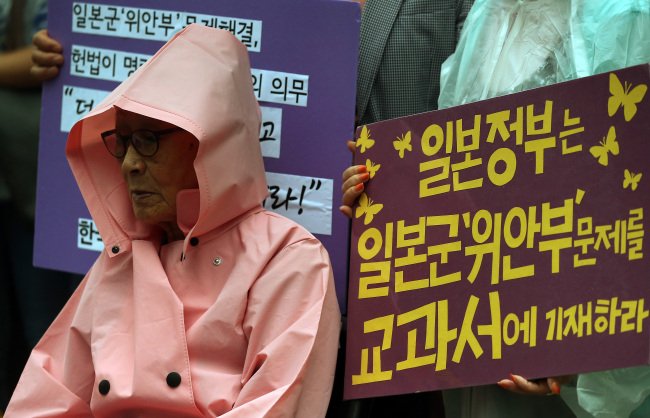The following is the sixth in a series of articles on Japan’s wartime sexual enslavement of Asian women on the occasion of the 61st anniversary of the foundation of The Korea Herald on Aug. 15. ― Ed.
On Wednesday around noon, some 100 activists, students and other citizens crowded outside the Japanese Embassy in Seoul, braving the wet weather and sudden drop in temperature. Their age, gender and political inclination may have varied, but they had one common cause: to urge Tokyo to atone and compensate for its sexual enslavement of Asian women during World War II.
 The Wednesday Demonstrations were launched in 1992 by the Korean Council for the Women Drafted for Military Sexual Slavery by Japan, a coalition of 37 women’s rights groups set out two years earlier. The initiative marked the 1,142nd edition, carrying on with its record as the world’s longest-running protest.
The Wednesday Demonstrations were launched in 1992 by the Korean Council for the Women Drafted for Military Sexual Slavery by Japan, a coalition of 37 women’s rights groups set out two years earlier. The initiative marked the 1,142nd edition, carrying on with its record as the world’s longest-running protest.
The Seoul-based organization has since been the vanguard of the country’s campaign to cast a light on Japan’s sexual crimes during the six-year conflict and bring justice to the victims and their families. It also organized a historic news conference in 1991, during which the late Kim Hak-sun became the first “comfort woman” to come forward.
Though controversy lingers over discord between members and what critics see a politicization of the issue, civil society has been playing a key role in ramping up pressure on Tokyo by raising awareness at home and rallying the international community behind Seoul’s claims.
On Wednesday around noon, some 100 activists, students and other citizens crowded outside the Japanese Embassy in Seoul, braving the wet weather and sudden drop in temperature. Their age, gender and political inclination may have varied, but they had one common cause: to urge Tokyo to atone and compensate for its sexual enslavement of Asian women during World War II.
 The Wednesday Demonstrations were launched in 1992 by the Korean Council for the Women Drafted for Military Sexual Slavery by Japan, a coalition of 37 women’s rights groups set out two years earlier. The initiative marked the 1,142nd edition, carrying on with its record as the world’s longest-running protest.
The Wednesday Demonstrations were launched in 1992 by the Korean Council for the Women Drafted for Military Sexual Slavery by Japan, a coalition of 37 women’s rights groups set out two years earlier. The initiative marked the 1,142nd edition, carrying on with its record as the world’s longest-running protest.The Seoul-based organization has since been the vanguard of the country’s campaign to cast a light on Japan’s sexual crimes during the six-year conflict and bring justice to the victims and their families. It also organized a historic news conference in 1991, during which the late Kim Hak-sun became the first “comfort woman” to come forward.
Though controversy lingers over discord between members and what critics see a politicization of the issue, civil society has been playing a key role in ramping up pressure on Tokyo by raising awareness at home and rallying the international community behind Seoul’s claims.

Its movement also emboldened more victims to provide vivid firsthand accounts of their harrowing pasts, while prompting the government to offer financial and administrative support.
The House of Sharing in Gwangju, Gyeonggi Province, provides housing, medical services and other necessities to 10 survivors. The shelter was set up in 1998 through private donations, along with a mini museum and gravestones for the deceased.
Some groups raise funds to support needy survivors and shore up their long-running campaign. Others carry out research on historical documents, news articles and other publications to support the victims’ testimonies.
“When we started more than 20 years ago, many victims were living in misery, hit by financial difficulties, social isolation and indifference. Kim Hak-sun herself had made her living by cleaning a public park in downtown Seoul,” said Kim Hye-won, the founding secretary of the council.
“I believe that as our movement kicked into high gear, people began scrapping their scornful attitude toward victims of sexual violence and started thinking differently ― that it is the perpetrator who should be ashamed ― which encouraged more victims to give testimony.”
In the U.S., the Korean-American community has proved a formidable force in the campaign.
Since a monument was erected in 2010 at Palisades Park in New Jersey in commemoration of the comfort women, nine similar memorials have been set up and another is in the works. New Jersey, New York and California house three statues each, and the other two are in Virginia and Michigan, respectively.
The project was made possible with the support of politicians and municipalities in regions where Korean-Americans form a key part of the electorate.
But over the years, the sex slavery issue has become a universal human rights concern across those states, in particular after Japan was found to have actively lobbied against the plans, experts say. The sites have been visited by congressmen including Rep. Ed Royce, chairman of the House Committee on Foreign Affairs, and Rep. Mike Honda, who sponsored a 2007 resolution demanding Japan’s apology for the sex slavery.
“The memorials help boost public awareness overseas,” said Seo Hyun-ju, a historian at the Northeast Asian History Foundation in Seoul.
“The fact that Japan mobilizes diplomats and businesses to stop their establishment means that it cares and knows such a campaign would hurt its national image.”

When a butterfly-shaped monument was completed early last month in Union City, New Jersey, two survivors ― Lee Ok-sun, 87, and Kang Il-chul, 86 ― joined the unveiling ceremony with some 400 people including Mayor Brian P. Stack and city commissioner Lucio Fernandez.
Blasting critics who called the drive “over the top,” Fernandez highlighted the Japanese sex slavery as a breach of human rights.
“We think over the top is having 300,000 girls as young as 11 years old raped 50 to 200 times a day,” he said.
“We think over the top is having 200 young girls kidnapped in Nigeria while most of us watched the World Cup. Over the top is the genital mutilation of girls in the Middle East. Over the top are the 300 girls per day that get gang-raped in India every single day and right here in Union City finding a bar full of captive young girls from Central America forced into prostitution.”
In addition to diplomatic negotiations, the Seoul government has been stepping up support for the survivors and their movement at home and abroad.
The Ministry of Gender Equality and Family plans to publish a white paper on the sex slavery in partnership with Kookmin University and Sungkyunkwan University in Seoul.
The ministry is also seeking to list comfort women on the Memory of the World Register by the U.N. Education, Scientific and Cultural Organization by 2017, an archive of documents of historical significance. China said in June that the agency has accepted its application to register records of the 1937 Nanjing Massacre and Japan’s wartime sex slaves.
Former minister Cho Yoon-sun had been at the center of the activities until she moved to Cheong Wa Dae as senior secretary on political affairs in June.
During her 15-month ministership, she visited all 50 survivors residing in Korea to look into their health and livelihoods, raised her voice at the U.N. and international meetings over sexual violence under conflict and traveled to the U.S. to lay a wreath at the Palisade Park memorial and meet with the members of the Korean American Civic Empowerment, which played a core role in its formation.
Her successor, Kim Hee-jung, vowed to boost support for the initiatives.
“The comfort women issue should be examined on not just the bilateral viewpoint between Korea and Japan but (from the perspective of) also fundamental human rights under armed conflict,” Kim told reporters recently.
By Shin Hyon-hee (heeshin@heraldcorp.com)











![[Today’s K-pop] BTS pop-up event to come to Seoul](http://res.heraldm.com/phpwas/restmb_idxmake.php?idx=644&simg=/content/image/2024/04/17/20240417050734_0.jpg&u=)




![[KH Explains] Hyundai's full hybrid edge to pay off amid slow transition to pure EVs](http://res.heraldm.com/phpwas/restmb_idxmake.php?idx=652&simg=/content/image/2024/04/18/20240418050645_0.jpg&u=20240419100350)

![[Today’s K-pop] Zico drops snippet of collaboration with Jennie](http://res.heraldm.com/phpwas/restmb_idxmake.php?idx=642&simg=/content/image/2024/04/18/20240418050702_0.jpg&u=)